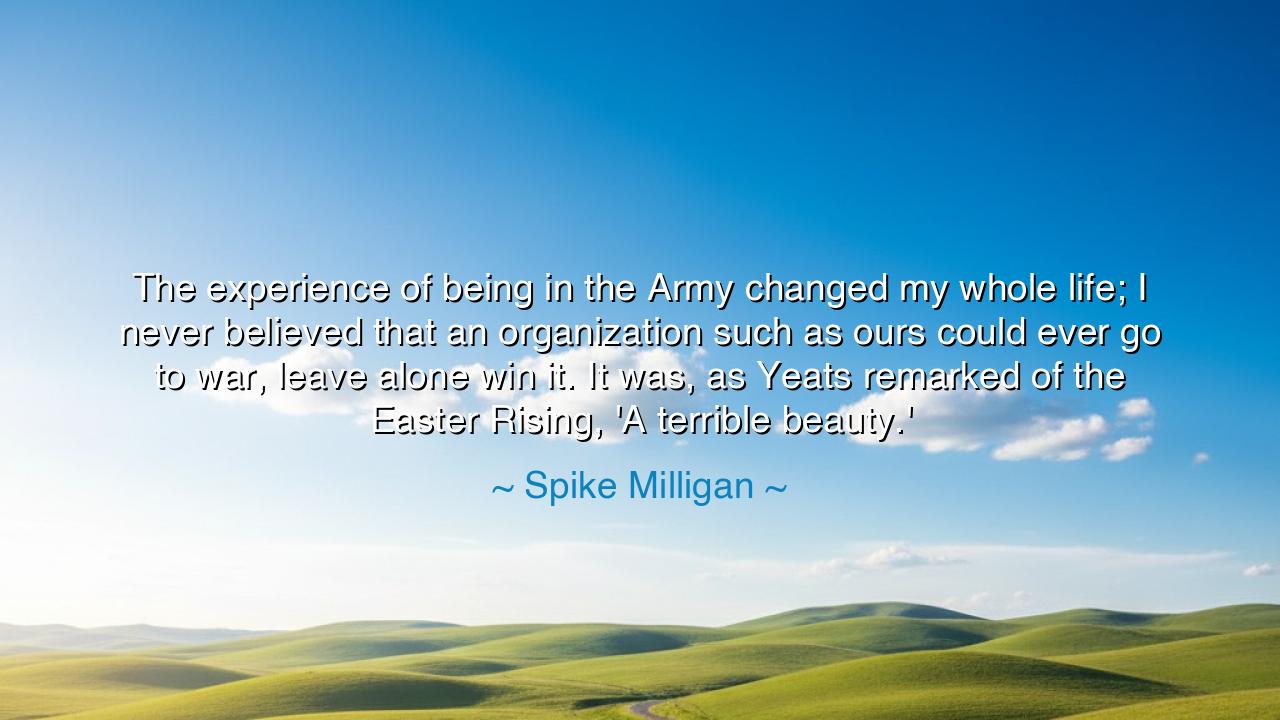
The experience of being in the Army changed my whole life; I
The experience of being in the Army changed my whole life; I never believed that an organization such as ours could ever go to war, leave alone win it. It was, as Yeats remarked of the Easter Rising, 'A terrible beauty.'






“The experience of being in the Army changed my whole life; I never believed that an organization such as ours could ever go to war, leave alone win it. It was, as Yeats remarked of the Easter Rising, ‘A terrible beauty.’” — thus wrote Spike Milligan, the great comedian, soldier, and poet, whose laughter was shaped by the shadow of war. In these few words lies the paradox of human history — that from the darkest acts of destruction can arise a strange, sorrowful magnificence. Milligan, who served as a gunner in the Second World War, speaks not only as a soldier but as a witness to the terrible beauty of conflict — the union of courage and horror, discipline and madness, despair and transcendence.
The origin of this quote lies in Milligan’s reflections on his wartime years, memories he later poured into his memoirs, Adolf Hitler: My Part in His Downfall. Known to the world for his humor, Milligan carried within him the scars of battle — both visible and unseen. The experience of serving in the British Army during the North African and Italian campaigns transformed him utterly. He had entered as a musician and dreamer, unsure of his place in the machinery of war, yet emerged with a deeper understanding of humanity’s contradictions. Through this, he echoed the Irish poet W. B. Yeats, who, in his poem Easter 1916, called revolution “a terrible beauty born” — for in both rebellion and war, something sublime and monstrous awakens at once.
When Milligan says he “never believed that an organization such as ours could go to war, leave alone win it,” he reveals his astonishment at the capacity of ordinary men to unite, endure, and achieve the impossible. Before war, armies seem faceless; during war, they become a living organism of will and fear, of brotherhood and death. In the chaos of the battlefield, Milligan discovered both the fragility and resilience of the human spirit. He saw how the absurdity of life — the very thing he would later turn into comedy — was laid bare in the trenches, where laughter and terror walked hand in hand.
To call this experience “a terrible beauty” is to acknowledge the dual nature of all profound transformation. War, in its cruelty, strips away illusion. It exposes the raw essence of mankind — capable of unimaginable destruction, yet also of loyalty, sacrifice, and love. In that crucible, men discover the truth of themselves. Many break beneath it; others emerge forever changed. For Milligan, who carried the wounds of war into his later life, this beauty was not to be celebrated but remembered — a tragic radiance that glimmers in memory like fire on wreckage.
History itself provides endless echoes of this paradox. Consider the soldiers of the Great War, who returned home from the trenches with haunted eyes and broken hearts. Their courage had shaped the course of nations, yet they carried within them a grief that words could scarcely hold. Or think of the Easter Rising of 1916, to which Yeats referred — an uprising crushed in blood, yet one that gave birth to Ireland’s independence. Out of ruin came renewal; from death, a strange rebirth. This is the terrible beauty that Milligan invokes — the recognition that even in humanity’s darkest hours, there flickers the light of meaning.
And yet, Milligan’s wisdom lies not in glorifying war, but in revealing its irony. For the same hand that builds civilization also burns it down; the same human heart that destroys also mourns and creates anew. The soldier’s lesson is not one of conquest, but of humility — to see how thin the veil is between order and chaos, laughter and despair. Through his art, Milligan turned this truth into comedy, as though laughter were his way of healing the wound. He understood that to face horror and still find humor is an act of defiance — a declaration that life, however fragile, will not surrender its light.
The lesson, then, is this: the world’s greatest transformations are born not of comfort, but of crisis. Whether in war or in one’s own private battles, beauty and terror are intertwined. We must never seek the terrible, yet when it comes, we must learn to find wisdom within it. Let pain deepen our compassion; let struggle awaken our gratitude; let memory remind us that even the most broken moments can reveal the strength of the human soul.
So let Spike Milligan’s words echo across generations: “It was, as Yeats remarked, a terrible beauty.” Remember that from ruin may arise renewal, that laughter can be born of tears, and that courage often blooms in the soil of fear. Live, then, with eyes open — not to glorify suffering, but to understand it. For the beauty that endures is not the beauty of perfection, but the beauty of endurance — the beauty that stands amid the wreckage and still dares to sing.






AAdministratorAdministrator
Welcome, honored guests. Please leave a comment, we will respond soon